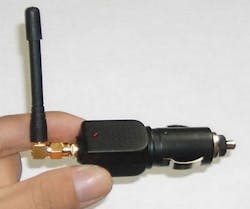GPS jamming is a growing threat to satellite navigation, positioning, and precision timing
If you depend on GPS a lot, then there's a good chance your trust is misplaced -- and that's just for finding a friend's house, a restaurant, or the newest trendy bar.
Experts are starting to delve into how well the Global Positioning System (GPS) satellite navigation network resists the effects of electronic jamming -- intentional or accidental. The emerging answer is not very well.
RF and microwave experts at Spirent Communications plc in Crawley, England, have been looking into electronic disruption to GPS signals for the past year and have come to some startling conclusions.
"We have been looking for disruptions to GPS around the world, and have found quite a lot of interference events -- and some deliberate ones as well," says Guy Buensel, PNT technologist at Spirent, a multinational telecommunications test and measurement company.
Related: Military GPS jammer tests could knock out satellite navigation to much of West Coast
If car GPS systems only questionably are reliable, what are the implications for commercial air traffic control, radar systems, smart munitions guidance, or truck and freighter ship fleet management?
Among Spirent's conclusions after a year of GPS testing: satellite navigation signals anywhere are subject to all kinds of interference that can compromise, degrade, or eliminate GPS signals in spotty temporary incidents.
These temporary GPS disruptions can cause a lot more trouble than meets the eye. The reason for this is Earth-bound GPS users rely on the service just as much for timing as they do for position information. GPS satellites have precise atomic clocks on board that offer accurate time-keeping never before available.
"We've seen examples of broadcast systems or telecommunications systems where you can lose timing synchronizing," Buensel says. "In digital broadcasting that means you can lose whole segments of a broadcast."
In another incident measured at Boston Logan Airport in Massachusetts, the airport's ground-based aircraft-approach system recorded temporary anomalies caused by a simple cigarette lighter-powered electronic jammer in a vehicle passing nearby the airport.
These small GPS jammers, available for less than $50, enable users to defeat efforts to track their vehicles with GPS signals by creating a bubble of RF interference around the vehicle as wide as a quarter-mile. When that vehicle passes by an airport or other facility that relies on GPS positioning and timing, then problems occur.
"GPS signals are weak and easy to interfere with," Buensel points out. "We started monitoring GPS L1 interference in May 2015. We put receivers on our roof in the U.K. I thought we would be lucky to see any interference. In a month we have several hundred cases of interference logged. We are surrounded by sites where there is a lot of electrical switch gear. There is a lot of interference that is accidental, but we saw a few cases of intentional jamming."
So will intentional and accidental GPS jamming cause aircraft to fall from the sky or trucks to smash into buildings? That's unlikely because most mission- and life-critical GPS devices have ample backup to handle intermittent outages, Buensel says.
Related: Raytheon to produce GPS navigation anti-jamming GPS antenna system
Spirent experts are trying to raise awareness of potential interference to GPS devices to help users prepare for the inevitable. If users know they are subject to jamming, they can take steps to mitigate its effects.
"GPS interference is very dependent on line of sight," Buensel explains. "It might be useful to know that there is GPS interference close by, so you could relocate the antenna." Other solutions could involve a holdover system like an oscillator or a complementary system like Loran," he says.
Military systems designers often can use techniques such as beam-steering or antenna nulling to defeat attempts to jam GPS signals. "There are solutions, depending on what you want to do and what the value of precision positioning is to you," Buensel says.
Spirent Communications specializes in test and measurement equipment that can detect GPS interference and point out potential solutions to mitigate GPS jamming. For more information contact Spirent online at www.spirent.com.
